Momma Interviews "Expert Edition" featuring Jessica Porten
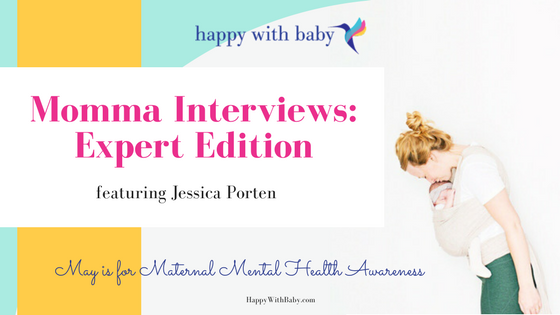
May is Maternal Mental Health Awareness Month, so I've relaunched my "Momma Interviews" series--This time with an extra special set of moms. These mommas also work to support other moms and their families during the transition into new parenthood and beyond. I'm calling it the "Expert Edition", but I think you'll find that while these women definitely are experts in their work, parenthood has a way of making a beginner out of everybody. Even experts get surprised by the unexpected and learn new bits of wisdom while in the trenches!
This series is all about their experiences with motherhood, in the hopes that it provides you with some validation and new tips to try. Because for all the many different ways there are to be a mom (and there are definitely MANY ways to do it right), it's so amazing how much we moms all really have in common.
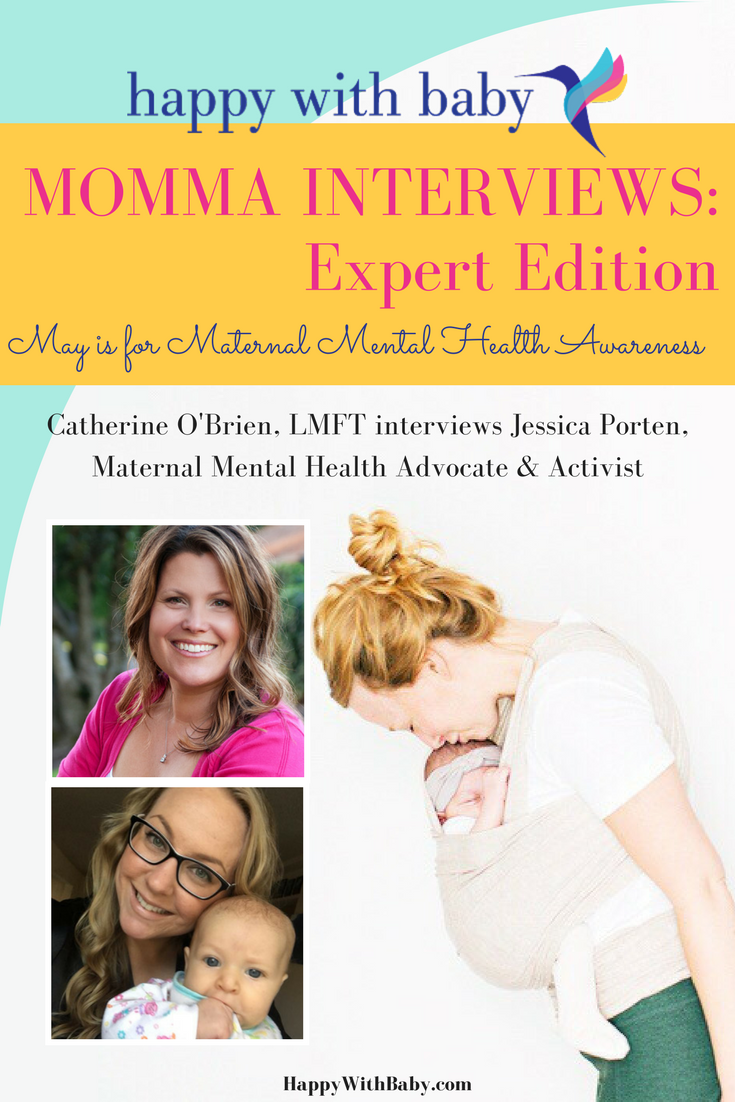
Mommas, I'm so excited to share this interview with Jessica Porten with you!
Jessica is a mom of two in Sacramento, CA and an activist for maternal mental health issues.
Scroll down to watch the interview, read the transcript or learn more about Jennifer.
Get to Know Jessica:
Unique Family Make-Up:
Happily married, with two daughters aged 2 and a half, and 7 months.
What do you do when you feel overwhelmed, overstretched, or less than?
I pay attention to my somatic responses - racing heart, feeling hot, feeling shaky - I acknowledge that I am having a hard time, and reaffirm to myself that I will get through this. I still struggle with staying ahead of self-deprecating, but my therapist is helping with Cognitive Behavioral Therapy to learn how to think positive again.
What is something that has surprised you about being a mom?
I didn't realize how much I would grow as a person. I feel so much more mature, and that my priorities are far different than they were prior to having a child. I pay attention to the news, local politics, and global issues with much more urgency now.
Any can't-live-without-it gadgets, products or hacks that have made mom life easier or better for you?
Teaching our older daughter the sign for "help me" was a game changer. It mitigated a lot of tantrums because she could communicate with us.
What is your favorite song that inspires you as a mom?
"Dear Mama" - Tupac
Watch the Video:
https://www.youtube.com/watch?v=wuGdiQIDJTM&w=854&h=480
Jessica's Quotables:
Interview Transcript:
Catherine: Hi. This is Catherine O'Brien at Happy With Baby, and I'm really excited to be here with another momma interview. This time we're here with Jessica Porten, who is a mom here in Sacramento. Thank you for being with us Jessica.
Jessica: You're welcome. Thank you for having me.
Catherine: Yeah. So, tell us a little bit about what ... a little bit about yourself and what's compelled you to get involved in the larger discussion around maternal mental health [inaudible 00:00:32] [crosstalk 00:00:29].
Jessica: I have two children. I have Luna Fay, she's two and a half, and then Kira Elle, she is 7 months' old, and what prompted me to get into the activism behind maternal mental health and bringing that to the forefront was just an experience that I had.
Jessica: I had postpartum depression after my second pregnancy with [Keira 00:00:00], and then when I went to get help from my doctor they ended up calling the police on me and having me escorted to the emergency room where I had to be cleared by a physician's assistant or they might have committed me.
Jessica: The whole experience was just really traumatic and seemed extremely unnecessary, and I just wanted to make sure that people ... it didn't happen to more people, and that children weren't being removed from the home, and that providers could better distinguish between postpartum psychosis and regular intrusive violent thoughts, and so now I'm just outspoken about it and trying to help raise awareness.
Catherine: Yeah, and you're doing a great job with that. I know that's a fear ... I've talked to other moms, that's a fear a lot of times of why they don't say anything, because they're afraid of how someone will interpret it even though they're like, "I know I don't want to hurt my child. I just have these intrusive thoughts that are keeping me scared, keeping me anxious, keeping me from being the mom that I want to be."
Jessica: Yeah.
Catherine: What do you want for all moms to know about maternal mental health? What do you think is important?
Jessica: That it's not always just depression, that it can manifest in a lot of different ways. Sometimes it's anger, sometimes it is the intrusive thoughts. Sometimes intrusive thoughts aren't violent, but oftentimes they are. It can present in several different ways, that it's normal, it happens to at least one in five, I think is the statistic right now, right? Then, certain subsets of the population it's even higher, or certain parts of the country it's higher, depending on where you live. That it's normal and it's okay to talk about it.
Jessica: I had a really bad experience coming out to my nurse practitioner, but I didn't have an established relationship with them, and so I think that it's really important for you to tell somebody. There's peer support online, there's Postpartum Support International warm line that you can call, a friend, family member, or your doctor. A lot of people do have a good relationship with their doctor ... or a therapist. Tell somebody, you're not alone.
Catherine: Right, yeah. Really important, you're definitely not alone, and with help you can get better.
Jessica: Yes! Yes! You can get better quickly, and with help you can prevent it. Build your village, you know?
Catherine: Yeah, have a good plan and resources in place, which I think a lot of times we don't know about and don't know how to access them, but there are some out there.
Jessica: Yeah, because I did build my village. I have a lot of support from my family. My husband is great, I have my dad, I have my mom, I have my husband's parents, and then all of our step-parents, and I have friends. I had the support system and I still got it, and that's okay. You know what I mean?
Catherine: Yeah.
Jessica: I knew my next step was to reach out to my doctor, and it would've been fine if I would've been able to get treatment, so I'm hoping to make that treatment more available to everybody.
Catherine: Right, right. It has to be easier to access, for sure.
Jessica: Yes, yes.
Catherine: Actually, it makes me think of something. A struggle I know a lot of moms I talk to is finding that their community, that village of support. Do you have recommendations? What would you say to someone that says they're afraid to ask for help? They feel weak maybe for asking if they need help.
Catherine: I know you're a great advocate for yourself, but how would you encourage moms to do that?
Jessica: The only reason why I knew to ask for help was because I had just read so much literature online, and firsthand accounts of women saying they regretted not asking for help. I didn't want to be one of those people, so I still continue to this day ask for help. My mother-in-law babysits my children on a regular basis.
Jessica: My younger daughter is still breastfed, but I can get away, I can go grocery shopping by myself, I can have a break, and I'm still a good mom.
Catherine: Yeah, I love that. Right?
Jessica: Yeah, don't let your guilt set in, because I think sometimes we feel so guilty or so ashamed, and it's really for no good reason, and sometimes I still feel that way, and it's okay. You don't have to beat yourself up for beating yourself up, you know?
Catherine: Yeah.
Jessica: As far as the support system and helping build that up I'd say the biggest piece is just building relationships. I think as a society we sit in our little bubbles, and I think it's important to get out there and make friends, and even though it's so hard sometimes. They don't always have to look like you or be your age. Some of my best friends are a generation ahead of me, my parent's age, and I'm actually finding a lot of healing in helping out women that are younger with me ... than me, with children.
Jessica: I found help in ... or healing in helping people as well as receiving help.
Catherine: Yeah, yeah. Oh, I love that. I love all of what you just said. Tell us a little bit about ... You said a little bit just now, but how do you balance being a mom, and all the work that you have to do, as well as your relationship roles with your husband and other family members?
Jessica: It's just a constant learning experience in having to ... Have the humility to admit when I've been wrong, and communication. I know that's such a [inaudible 00:06:30] at this point, you know what I mean?
Catherine: Yeah.
Jessica: The communication is [inaudible 00:06:33], but it really is. There's a reason why that's a saying, because communication is so important. When my husband does something that upsets me we talk about it, and when I do something that upsets him we talk about it, and we learn from it, and we try not to repeat it. It's all about talking. Checking in with one another, constantly checking in with one another.
Catherine: I know he's busy because he's a student and everything too, so how do you find that time then to check in, because that's something that I hear about too, is finding that ... You have two small children, and you guys both have these things that you're doing, and where do you find the time to do that?
Jessica: We still struggle with it, we're definitely not perfect. We just had a fight not even four days ago, because we weren't checking in with each other often enough. It's a process.
Jessica: What we find to be most successful is ... actually scheduling time. Something that's really helped us since we have two small children is scheduling alone time with each individual child, even if it's just for 10 minutes a day. Even if it's just for 10 minutes a day, one-on-one time with just him and I, one-on-one time with just him and I and one child, and one-on-one time with just him and I and the other child, and then all four of us. We try to schedule that in a little bit each day so that we don't become so caught up in our daily life and our daily routine that all of a sudden the days and the weeks are passing, and you're not really hanging out with each other and enjoying each other. As long as we make time to have conversations over coffee, over food. Mealtime is a big one for us, we check in a lot over mealtime. I say to use that for sure.
Catherine: Yeah, we do that, too. I think it's like, yeah, slow down long enough to look at each other and be like, "Hey, how's it going?," like I'm not just passing you as I'm doing dishes or putting stuff away, but like, "Hey."
Jessica: Texting, too. Texting. I text him when he's gone from the house and just remind him that I love him, and that I'm thinking about him, and he doesn't do it as often as he should.
Catherine: I hope he's listening.
Jessica: [inaudible 00:08:44][crosstalk 00:08:44]. I think a little bit of everything, you know what I mean? Oftentimes we are ... Technology can be a good thing.
Catherine: It can be.
Jessica: It can if you use it responsibly it can be a good tool for your relationship.
Catherine: Right, right. I'll tell people I know, sometimes that's the only time you can be like, "Hey, what's going on?," but if you start to sense a tone before you assume that it's a negative one, maybe you have a verbal conversation, ideally face-to-face. Be like, "Hey, I interpreted it this way, was I reading that right?"
Jessica: Yes. Absolutely. You shouldn't just be texting.
Catherine: Right. No, no. I love all those tips. That's awesome, Jessica. Thank you. What do you feel is your greatest personal struggle with the experience of motherhood?
Jessica: Ooh. Keeping my patience in mindful parenting. It's really hard for me not to yell, and so that's something that I make it a personal goal. Every day I tell myself I'm not gonna yell today. Some days I fail and some days I do yell, and realizing that I am still a good mom, because I'm trying to constantly improve upon myself better than I was yesterday.
Jessica: It doesn't matter who I am compared to the people around me. I can learn from the people around me, but ultimately it's me, right?
Catherine: Mm-hmm (affirmative).
Jessica: I just try to be a better parent than I was yesterday. My biggest struggle is my patience, and a lot of that came from the postpartum depression, because my symptoms manifested in a lot of anger and rage. I definitely was a rage momma for a while. Just not yelling has been I think the biggest one for me.
Catherine: Yeah. We all make mistakes. I think it's just being able to recognize it. There's times even still all the time ... My kids are older than yours, but I have to apologize and like, "Mommy overreacted to that. I shouldn't have done that, and I'm gonna try better and this is how I'm gonna try better, too."
Jessica: I learned that from you-
Catherine: Have you?
Jessica: That makes me feel better. It does. When I talk to my kids afterwards, and I let them know that mommy made a mistake, and mommy shouldn't have yelled. That's something that I learned from you, thank you.
Catherine: Really? Aw. Thank you.
Jessica: Yes, uh-huh. It's helped me control my emotions. I find that when I apologize for inappropriate behavior, just as an adult, it helps reaffirm to not do that behavior more often. I find I yell less when I apologize for yelling.
Jessica: Yeah, no. Thank you very much for that. I forgot to thank you for that earlier. That was a great parenting tip.
Catherine: Oh, good. Thank you. I'm so glad that was helpful. I find that I also get over it faster, too. Where it's like I can be upset about something, and then I'll be like, "Oh, gosh. You're totally [inaudible 00:11:35]." "You're totally overreacting to the situation." They're being kids, they're doing what they do best.
Jessica: Yes, and I think it's good for them, too, to see what it's like to apologize, and to actually feel bad for your actions. I think sometimes we get it in our head that children don't understand apologies, and it might just be because they don't get them often enough.
Catherine: Yeah. Yeah. Well, they do, they model, and I know now that my kids are older and I'll hear them know how to make apologies as well-
Jessica: Your apologies, yeah.
Catherine: Yeah. Well, good. I'm so glad that's helpful for you. Yeah, I think you're doing a wonderful job. We all have struggles and challenges that we deal with on a regular basis, so I think you're definitely helping to normalize that, too.
Jessica: Thank you. I try.
Catherine: I think it's just nice to know ... I have moms come into my office and they'll tell me, "Oh, I feel this way and this way," and I'm like, "Yeah, I hear those same things all the time," and sometimes I think it's shocking to feel like, "Really, other moms feel this way or other parents feel this way?" It's like, "Yep, yep. They do, we do, I do."
Jessica: Yes. It's very common [inaudible 00:12:52] parenting struggles.
Catherine: Yeah, yeah. What would you say is the greatest lesson you've learned as a mom?
Jessica: Oh, wow. The greatest lesson I have learned as a mom?
Catherine: If you can name one.
Jessica: Just to get out of their way. Get out of their way. Let them climb, let them jump-
Catherine: Make messes.
Jessica: Let them be risky, let them make messes, let go. I'm just there to catch her if she falls. Get out of their way, let them explore, let them ... As long as they're not gonna choke on anything or die they're fine.
Catherine: Yeah, yeah. I know. That can be a really hard thing to do, especially if we're more ... I tend to more Type A, which I never realized until-
Jessica: Yes, me too.
Catherine: I had someone tell me. I'm like, "I'm Type A?" My husband's like, "Yeah, yeah." Then, it was like, "Okay, yeah. Okay, let go," and I think that's what ... That's one of the things I think parenting/motherhood- [inaudible 00:13:49][crosstalk 00:13:49]
Jessica: That also makes it hard to accept or ask for help being a Type A, because-
Catherine: That's true.
Jessica: It's like, "Can you do this for me?," and then you're like, "No, no, no, but not like that." You know?
Catherine: Yeah. Yeah.
Jessica: Because they're doing it wrong.
Catherine: Yeah, I'll tell parents, "Figure out the things that you're okay letting people do for you, the things that are less that you feel you have to control a certain way. If you're really particular, laundry has to be folded exactly this way then you probably don't want people to fold your laundry. But, if you'll let them wash your dishes and put them in the dishwasher then let them do that. Find the things you're good with having people do and let them do those things."
Jessica: Yes.
Catherine: Yeah, we can't do it all, it's too hard.
Jessica: No, and even if you could you shouldn't, because it's not good for your mental health.
Catherine: No. No.
Jessica: That's from Maternal Mental Health Awareness Month.
Catherine: Yes.
Jessica: Don't even try to do it all, it's bad for your mental health. Don't even try-
Catherine: That's a quote. I'm putting that on a little ... It's gonna be a little meme.
Catherine: Okay, all right, so one more. What is one piece of advice you like to give other moms?
Jessica: One piece of advice I would like to give other moms?
Catherine: Can you think of one?
Jessica: Look out for your mental health, look out for your health. Your health and your mental ... well, your mental health is your body health, and your body health is your mental health, because if you're not well then you can't take care of your own kids, right?
Catherine: Mm-hmm (affirmative). Right.
Jessica: Look out for yourself, because then you can look out for your children. I think a lot of times we sacrifice ourselves for our children when there's really no need to be a martyr. There's absolutely no reason for it.
Catherine: No.
Jessica: Right? We take on too much, when both us and our children can benefit from some outside help.
Catherine: Yeah. Yeah, and I find that even now ... I guess now that my kids are old enough to talk and share their feelings and thoughts, they love it when somebody else comes in takes them for the day, or they get to spend the night at Nanna's or something like that, and so it's amazing for us, but they love the break just as much, too.
Jessica: Yeah, I think sometimes when we take breaks or have other people watch our kids we kind of feel like we're letting them down.
Catherine: Yeah.
Jessica: Perhaps they're not getting the same quality of care from another person, when in reality if we're the only ones taking care of them, that quality of care is not very good, because we get tired of it, you know what I mean?
Catherine: Yeah.
Jessica: It's important to have other caretakers for your children.
Catherine: Yeah, yeah. Yeah, absolutely. Absolutely. I love everything that you said. I love what you're sharing, I love the messages that you're putting out there, and being able to work with you to help raise awareness, and build more resources here in Sacramento, and find the connections so moms don't have to go without support. I'm glad we've been able to team up.
Jessica: I'm super glad, too, thank you. I'm excited for the Sacramento Maternal Mental Health Collaborative.
Catherine: Yes, yes, me, too. Thank you so much for taking time out of your day, and meeting with me, and I know your message definitely helps other moms out there, so thank you.
Jessica: Thank you.
Catherine: All right.
About Jessica Porten:
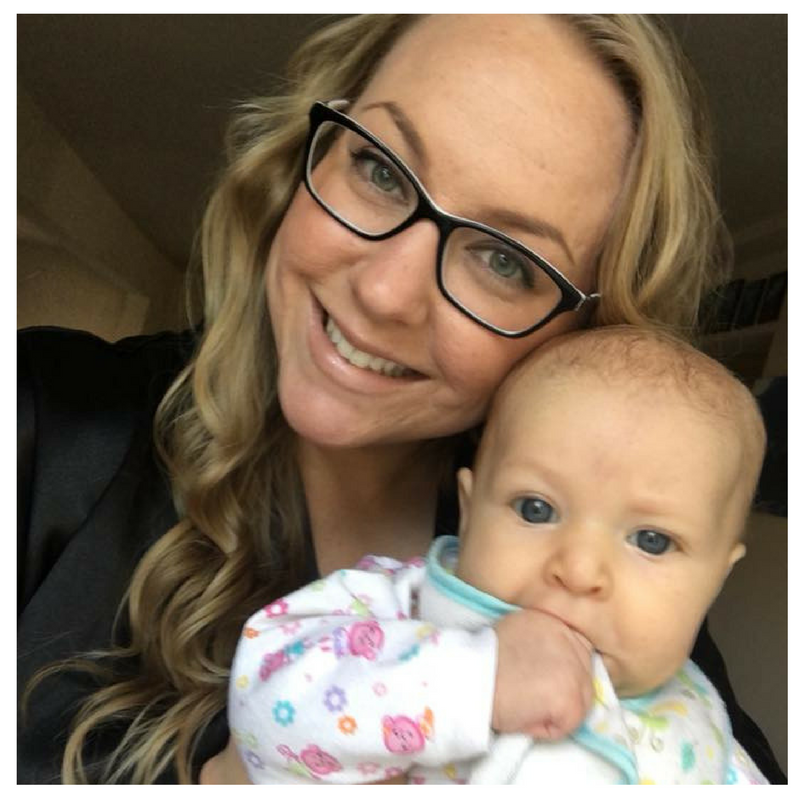
Jessica Porten is a mother of two from Sacramento, CA. She is an activist and advocate for moms and maternal mental health issues. Jessica made waves when her Facebook post about seeking help for her postpartum depression from her OBGYN went viral overnight. She now partners with 2020Mom to provide maternal mental health resources and lobby for legislative change to improve conditions for new and expecting mothers.
Connect with Jessica:
Subscribe
Sign up to get the latest weekly blogs sent straight to your inbox


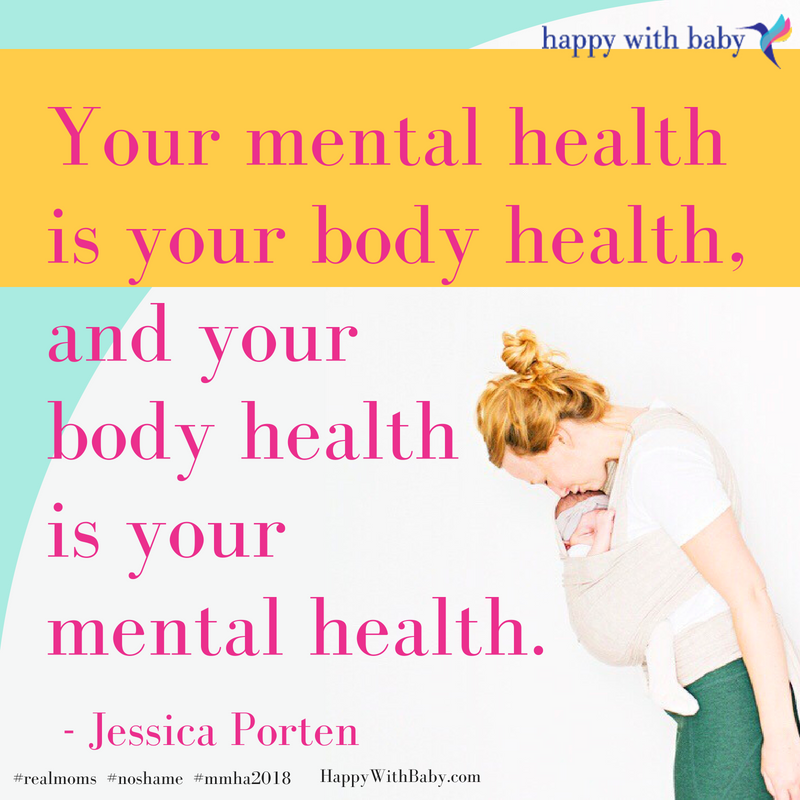
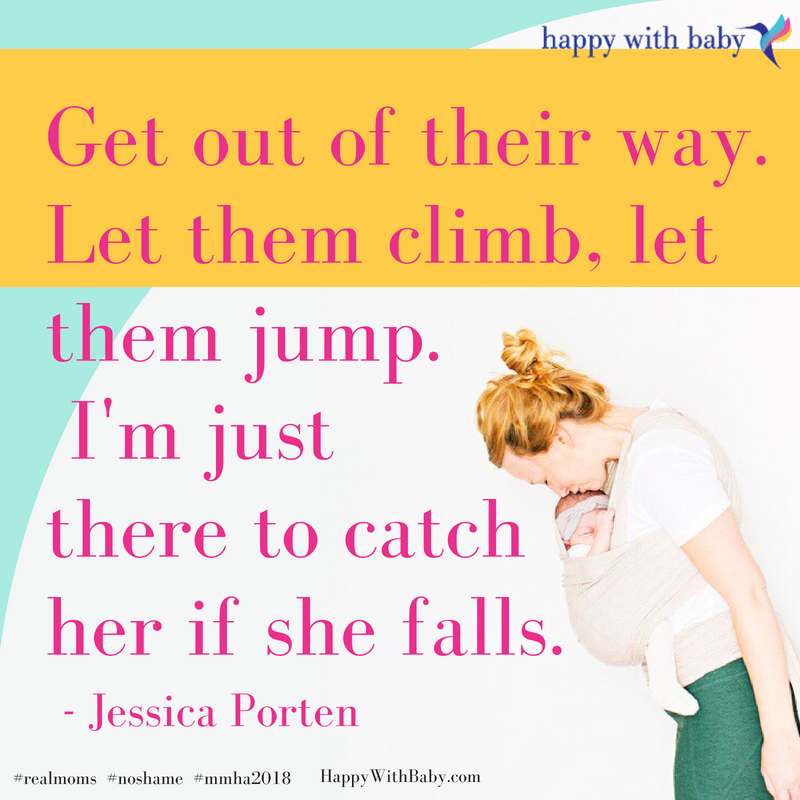
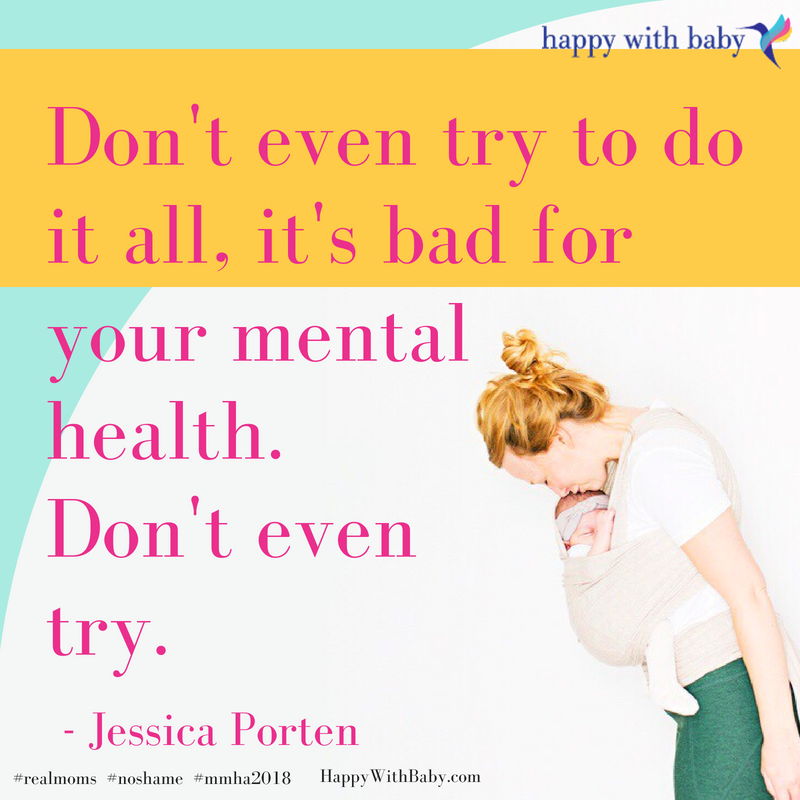
0 comments
Leave a comment
Please log in or register to post a comment